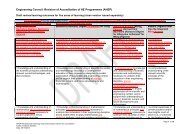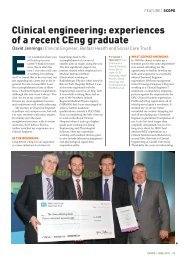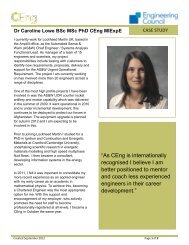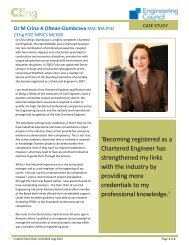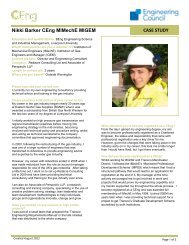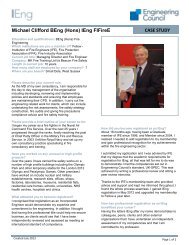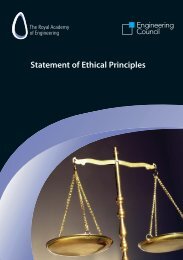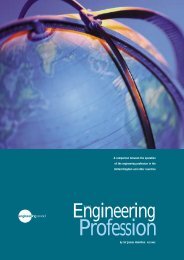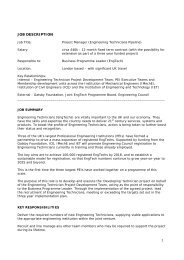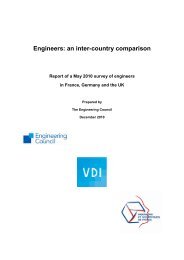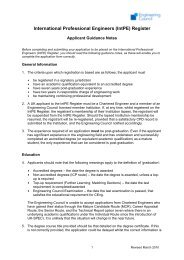An Engine for Change - A Chronicle of the Engineering Council
An Engine for Change - A Chronicle of the Engineering Council
An Engine for Change - A Chronicle of the Engineering Council
You also want an ePaper? Increase the reach of your titles
YUMPU automatically turns print PDFs into web optimized ePapers that Google loves.
1988-1990: THE BARLOW YEARS 63This campaign continued its success during 1989. To assist <strong>the</strong> move in encouraging girls andwomen to take up a career in engineering, <strong>the</strong> number <strong>of</strong> events in <strong>the</strong> booklet directory‘WISE – Awards, Courses, Visits’ was expanded in February 1989 from 27 to 58 entries andreprinted <strong>for</strong> free issue thanks to sponsorship from BICC plc. In April 1989 two companion‘<strong>Engine</strong>ering Equals’ booklets were published with financial support from <strong>the</strong> TrainingAgency. For both booklets <strong>the</strong> Foreword was signed jointly by <strong>the</strong> Rt Hon Norman FowlerMP, Secretary <strong>of</strong> State <strong>for</strong> Employment, and Sir William Barlow, <strong>the</strong> EngC Chairman. Thebooklets, ‘<strong>Engine</strong>ering Equals – Higher Education Institutions’ and its companion,‘<strong>Engine</strong>ering Equals – Schools and Colleges’, <strong>of</strong>fered guidance to teachers on methods <strong>of</strong>encouraging young women to consider engineering as a career option and avoid <strong>the</strong> pitfalls <strong>of</strong>gender stereotyping. A third version <strong>of</strong> this booklet, <strong>for</strong> staff in primary schools, wasproduced in 1990 in partnership with <strong>the</strong> Society <strong>of</strong> Education Officers and <strong>the</strong> Association<strong>of</strong> Directors <strong>of</strong> Education in Scotland and with support from 21 o<strong>the</strong>r educational bodies. TheIntroduction to this version was written by Rt Hon Kenneth Clarke, Secretary <strong>of</strong> State <strong>for</strong>Education and Science. Copies were distributed to 27,500 primary schools throughout <strong>the</strong>United Kingdom.In 1990 a new 40ft articulated trailer, sponsored by British Rail’s Signalling andTelecommunications Division, was added to <strong>the</strong> fleet <strong>of</strong> WISE mobile classroom vehicles.During <strong>the</strong> year <strong>the</strong> EngC issued <strong>the</strong> 4 th edition <strong>of</strong> ‘Awards, Courses and Visits’, <strong>the</strong> directorylisting events to encourage girls and women into an engineering career; this edition,sponsored again by <strong>the</strong> BICC Group, promoted 149 special events. By <strong>the</strong> close <strong>of</strong> <strong>the</strong> year75,000 girls had benefited from <strong>the</strong> WISE campaign. Of students now entering engineeringdegree courses, 12% were women compared with 7% when WISE began in 1984 althoughonce more <strong>the</strong> EngC received little, if any, recognition <strong>for</strong> this major and far-reachingachievement.Neighbourhood <strong>Engine</strong>ersThrough its Neighbourhood <strong>Engine</strong>ers scheme <strong>the</strong> EngC planned to encourage and harnesslocal enthusiasm to make a genuine impact on entrenched attitudes in British schools towardsengineering, and to change <strong>the</strong> nation’s culture away from negative images. It was hoped thatfull-time project managers with secretarial support could be appointed in every EngC region.The idea was to link over 30,000 Registrants with local secondary schools in <strong>the</strong>irneighbourhood so that four or five Neighbourhood <strong>Engine</strong>ers could be allocated to everyschool in <strong>the</strong> country, giving advice and support on projects, designs and materials. Theengineers would work with <strong>the</strong> Heads <strong>of</strong> Science and Ma<strong>the</strong>matics thus meeting <strong>the</strong>particular needs <strong>of</strong> each school in a sensitive and practical way. The scheme, begun as a trialin Devon and Cornwall, South Wales and <strong>the</strong> South West <strong>the</strong>n underwent a full DemonstratorProject during 1988 in 225 schools in Merseyside and Cheshire. In support <strong>of</strong> <strong>the</strong> scheme abooklet ‘Neighbourhood <strong>Engine</strong>ers – Practical Support <strong>for</strong> Schools’ was published inDecember 1988.In <strong>the</strong> Merseyside and Cheshire Demonstrator Project over 10% <strong>of</strong> local EngC Registrantsparticipated. Eric Forth, Parliamentary Under Secretary <strong>of</strong> State <strong>for</strong> Industry and ConsumerAffairs visited <strong>the</strong> EngC <strong>of</strong>fices early in 1989 to hear at first hand about this project. The DTIprovided £600,000 to help set up <strong>the</strong> scheme, on condition that <strong>the</strong> EngC could raise similarresources, particularly from industry. British Nuclear Fuels plc provided one <strong>of</strong> its engineers,Brian Thomas CEng, on secondment to manage <strong>the</strong> overall project. O<strong>the</strong>r industries providedfull-time secondees to act as project managers, released engineers and technicians to visit© <strong>Engine</strong>ering <strong>Council</strong> UK 2004



